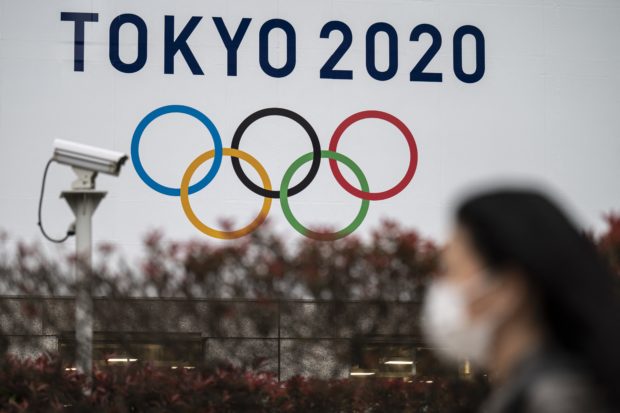Virus surges fuel fears 100 days before Tokyo Olympics

A Tokyo 2020 Olympics Games banner is displayed on the wall of the Tokyo Metropolitan Government building in Tokyo on April 13, 2021. (Photo by Charly TRIBALLEAU / AFP)
TOKYO, Japan – The Olympic flame is on its way across Japan and athletes around the world are ramping up training, but 100 days before Tokyo 2020 opens, organisers still face monumental challenges.
Virus surges, including in Japan, are playing havoc with preparations and fuelling uncertainty about whether the Games can, or should, happen this summer.
The torch relay has been pared back, overseas fans will be barred for the first time and rising infections mean Tokyo and several other parts of Japan are under new restrictions.
Despite that, the tone from organisers and Olympic officials is still one of confidence, with public pronouncements focused on how the Games will happen, not whether they will.
They have some cause for optimism.
The Olympic torch relay kicked off in Fukushima last month, albeit with spectators barred from the launch ceremony, and vaccination programmes are under way in many countries, with some teams already given their shots.
Japan won’t require Olympic participants to be vaccinated, but the International Olympic Committee is encouraging jabs and has secured Chinese-made doses for athletes in countries without access to them.
In Japan, sports events are still on, with crowd numbers capped, and fans have become used to virus rules that will be implemented at this summer’s Games, including a ban on cheering.
North Korea’s decision to skip Tokyo 2020 over virus concerns has not prompted a rush for the exits, with athletes mostly seeming impatient for a return to the international stage.
“These past 14 months have been very motivating for all of us,” five-time Olympic gold medallist swimmer Katie Ledecky said last week.
“Once we get there we really want to show the world all the work that we’ve put in.”
In Japan, swimmer Rikako Ikee has added a feel-good factor by winning a spot on the Olympic relay team just two years after being diagnosed with leukemia.
‘Safe and secure Games’
But it’s far from all good news, just over a year after the historic postponement.
COVID-19 surges across Japan have forced the government to tighten restrictions only weeks after they were lifted.
In Osaka, the spike prompted the governor to bar the Olympic flame from public roads. It is instead being carried around a closed course at a park, with spectators kept out.
Continuing virus restrictions are also disrupting test events and qualifiers, with several postponed because of Japan’s strict anti-virus border controls, which mean overseas officials can’t enter the country.
Despite the problems, Tokyo 2020 organisers say they are confident “we will be able to deliver a safe and secure Games.”
They have released “playbooks” outlining anti-virus measures, which will be updated later this month, hoping to allay the fears of a public still largely opposed to holding the Games this year.
Tens of thousands of athletes and other Olympic participants arriving from overseas will be able to skip quarantine, and are not required to show proof of vaccination.
But athletes will be asked to limit their movements, stay only at the Olympic village during their events, and face regular virus testing.
Overseas fans have already been barred from the Games, and a decision on domestic spectator numbers could come in April.
But however many fans are in the venues, the atmosphere will be far from the usual rowdy celebrations, and it remains unclear how strong demand for tickets will be when they finally go back on sale.
Polls show most Japanese back either a further postponement or cancellation, but the numbers in favour of holding the Games this summer have crept up slightly, to around 27 percent in March, from just 11 percent in January.
“The COVID-19 situation will naturally influence the public view of the Games,” organisers said in response to questions from AFP.
They noted that most Olympics face criticism before they begin, but said they expect the mood to change once athletes take the stage after the July 23 opening ceremony.
“Every time, we are inspired by their strength and resilience, and that will be truer than ever this year.”
gsg
Agence France-Presse
For more news about the novel coronavirus click here.
What you need to know about Coronavirus.
For more information on COVID-19, call the DOH Hotline: (02) 86517800 local 1149/1150.
The Inquirer Foundation supports our healthcare frontliners and is still accepting cash donations to be deposited at Banco de Oro (BDO) current account #007960018860 or donate through PayMaya using this link.